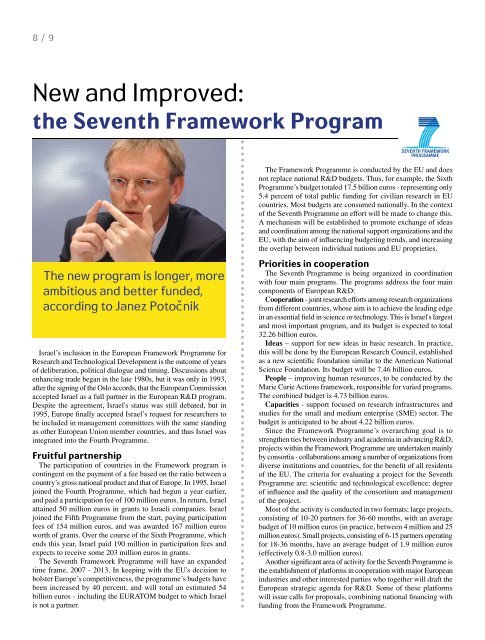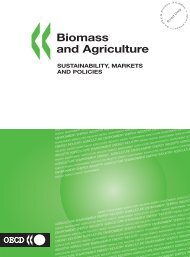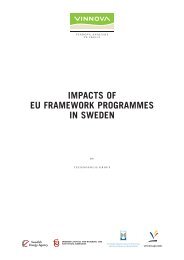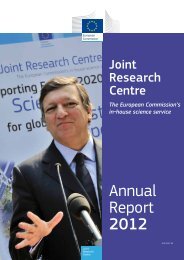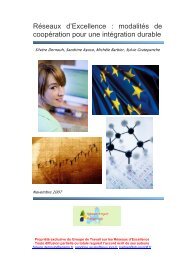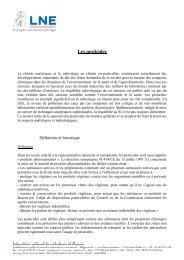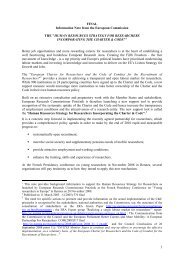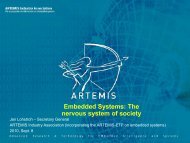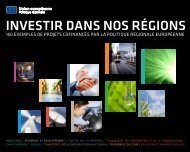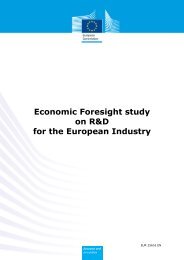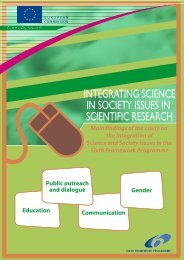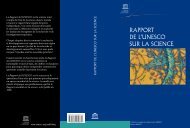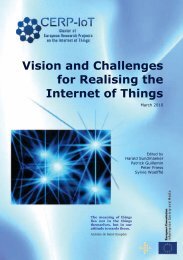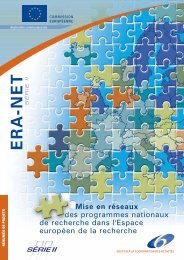Télécharger le document - Eurosfaire
Télécharger le document - Eurosfaire
Télécharger le document - Eurosfaire
You also want an ePaper? Increase the reach of your titles
YUMPU automatically turns print PDFs into web optimized ePapers that Google loves.
∏ Ø π<br />
New and Improved:<br />
the Seventh Framework Program<br />
The new program is longer, more<br />
ambitious and better funded,<br />
according to Janez Potočnik<br />
Israel’s inclusion in the European Framework Programme for<br />
Research and Technological Development is the outcome of years<br />
of deliberation, political dialogue and timing. Discussions about<br />
enhancing trade began in the late 1980s, but it was only in 1993,<br />
after the signing of the Oslo accords, that the European Commission<br />
accepted Israel as a full partner in the European R&D program.<br />
Despite the agreement, Israel's status was still debated, but in<br />
1995, Europe finally accepted Israel’s request for researchers to<br />
be included in management committees with the same standing<br />
as other European Union member countries, and thus Israel was<br />
integrated into the Fourth Programme.<br />
Fruitful partnership<br />
The participation of countries in the Framework program is<br />
contingent on the payment of a fee based on the ratio between a<br />
country’s gross national product and that of Europe. In 1995, Israel<br />
joined the Fourth Programme, which had begun a year earlier,<br />
and paid a participation fee of 100 million euros. In return, Israel<br />
attained 50 million euros in grants to Israeli companies. Israel<br />
joined the Fifth Programme from the start, paying participation<br />
fees of 154 million euros, and was awarded 167 million euros<br />
worth of grants. Over the course of the Sixth Programme, which<br />
ends this year, Israel paid 190 million in participation fees and<br />
expects to receive some 203 million euros in grants.<br />
The Seventh Framework Programme will have an expanded<br />
time frame, 2007 - 2013. In keeping with the EU's decision to<br />
bolster Europe’s competitiveness, the programme’s budgets have<br />
been increased by 40 percent, and will total an estimated 54<br />
billion euros - including the EURATOM budget to which Israel<br />
is not a partner.<br />
The Framework Programme is conducted by the EU and does<br />
not replace national R&D budgets. Thus, for examp<strong>le</strong>, the Sixth<br />
Programme’s budget tota<strong>le</strong>d 17.5 billion euros - representing only<br />
5.4 percent of total public funding for civilian research in EU<br />
countries. Most budgets are consumed nationally. In the context<br />
of the Seventh Programme an effort will be made to change this.<br />
A mechanism will be established to promote exchange of ideas<br />
and coordination among the national support organizations and the<br />
EU, with the aim of influencing budgeting trends, and increasing<br />
the overlap between individual nations and EU proprieties.<br />
Priorities in cooperation<br />
The Seventh Programme is being organized in coordination<br />
with four main programs. The programs address the four main<br />
components of European R&D:<br />
Cooperation - joint research efforts among research organizations<br />
from different countries, whose aim is to achieve the <strong>le</strong>ading edge<br />
in an essential field in science or technology. This is Israel's largest<br />
and most important program, and its budget is expected to total<br />
32.26 billion euros.<br />
Ideas – support for new ideas in basic research. In practice,<br />
this will be done by the European Research Council, established<br />
as a new scientific foundation similar to the American National<br />
Science Foundation. Its budget will be 7.46 billion euros.<br />
Peop<strong>le</strong> – improving human resources, to be conducted by the<br />
Marie Curie Actions framework, responsib<strong>le</strong> for varied programs.<br />
The combined budget is 4.73 billion euros.<br />
Capacities - support focused on research infrastructures and<br />
studies for the small and medium enterprise (SME) sector. The<br />
budget is anticipated to be about 4.22 billion euros.<br />
Since the Framework Programme’s overarching goal is to<br />
strengthen ties between industry and academia in advancing R&D,<br />
projects within the Framework Programme are undertaken mainly<br />
by consortia - collaborations among a number of organizations from<br />
diverse institutions and countries, for the benefit of all residents<br />
of the EU. The criteria for evaluating a project for the Seventh<br />
Programme are: scientific and technological excel<strong>le</strong>nce; degree<br />
of influence and the quality of the consortium and management<br />
of the project.<br />
Most of the activity is conducted in two formats: large projects,<br />
consisting of 10-20 partners for 36-60 months, with an average<br />
budget of 10 million euros (in practice, between 4 million and 25<br />
million euros). Small projects, consisting of 6-15 partners operating<br />
for 18-36 months, have an average budget of 1.9 million euros<br />
(effectively 0.8-3.0 million euros).<br />
Another significant area of activity for the Seventh Programme is<br />
the establishment of platforms in cooperation with major European<br />
industries and other interested parties who together will draft the<br />
European strategic agenda for R&D. Some of these platforms<br />
will issue calls for proposals, combining national financing with<br />
funding from the Framework Programme.


